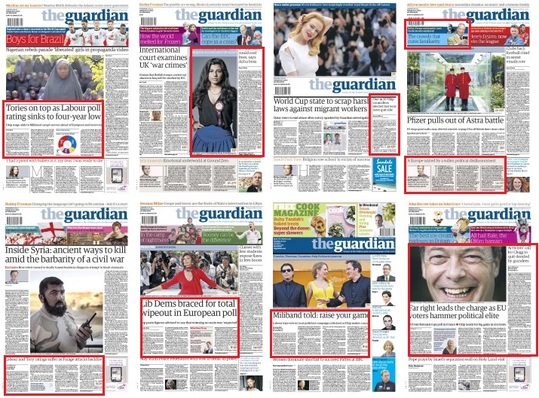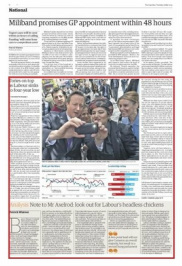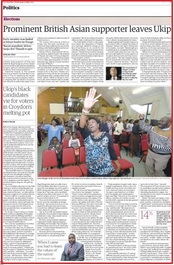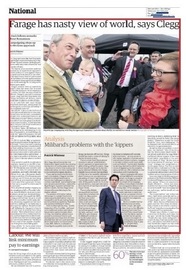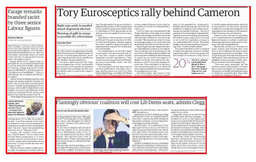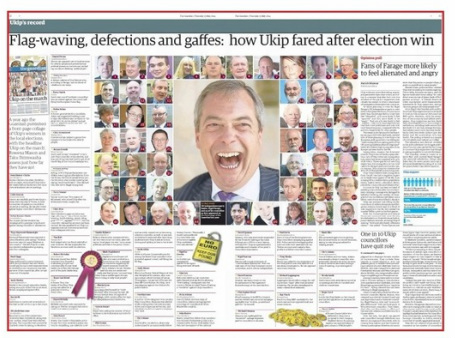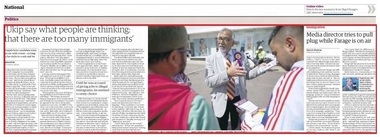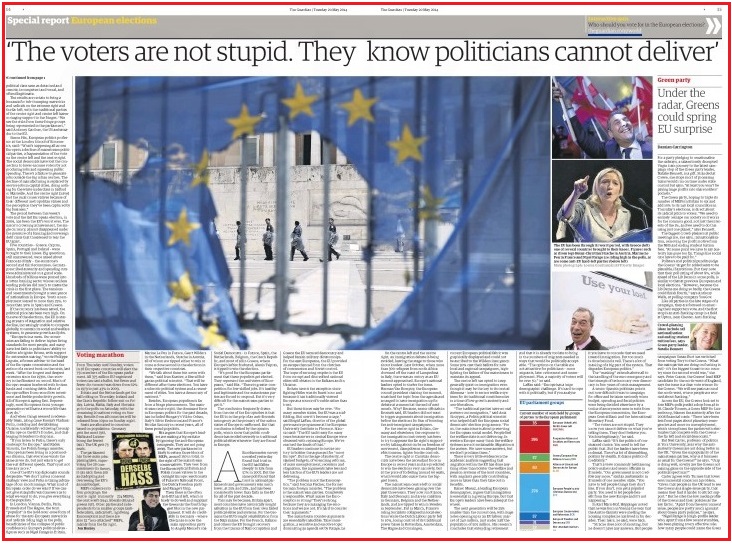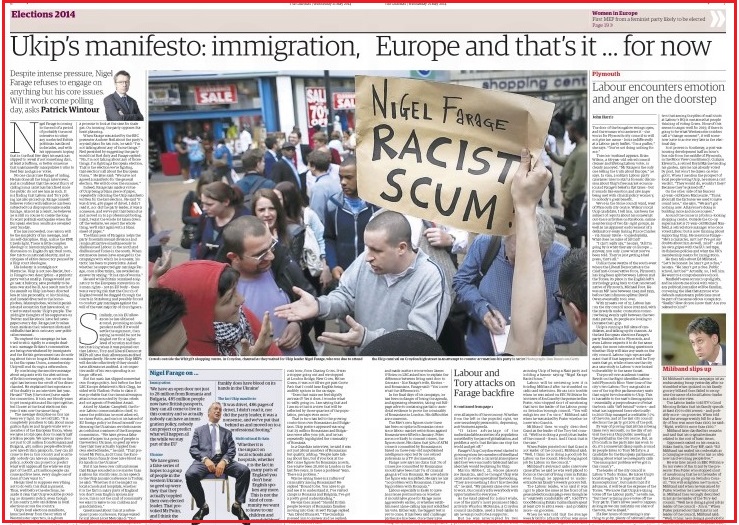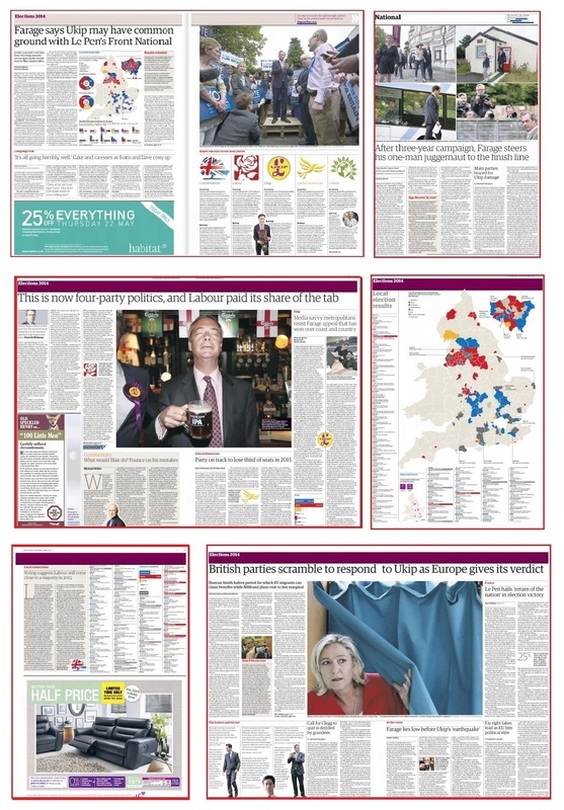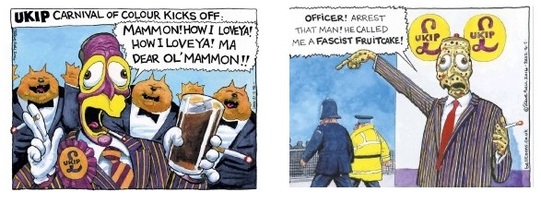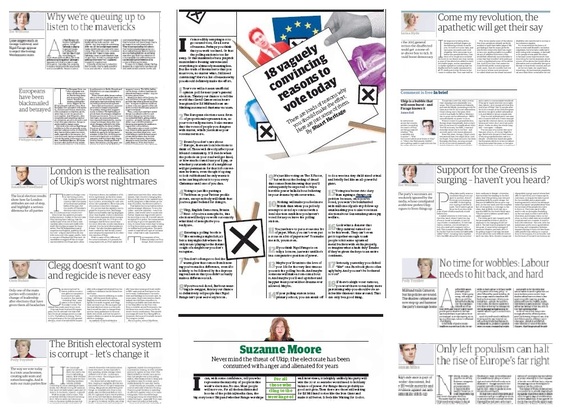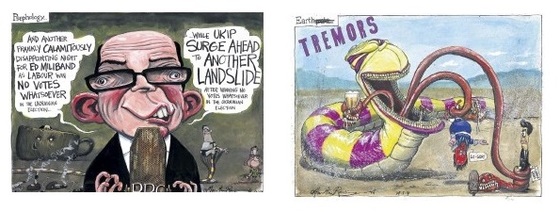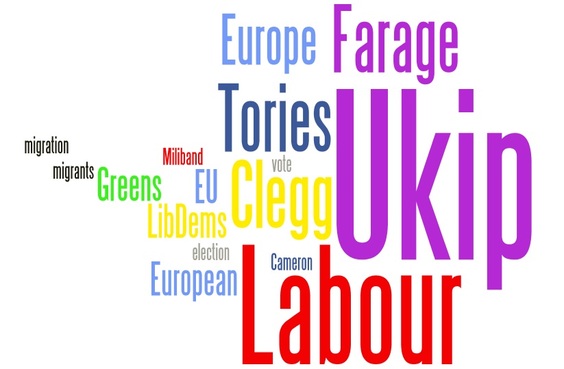The European elections auditHow the nationals covered the European and local campaigns from May 12-26
The Guardian: front pagesThe elections featured on the front of the Guardian ten times between May 12 and 26. This was in addition to a splash on Miliband's plan for the minimum wage and a column six story on the paper's bid to co-host next year's general election leaders' debate. Two of the front-page offerings were based on opinion polls and two were background features that started on page one and turned to spreads inside. The elections made the splash three times: on polling day and after the two results nights. The paper broke the story about Sanya-Jeet Thandi leaving the party because she thought it had "descended into a terrifying form of racist populism". Politicians made the front-page picture only twice - one of Farage after the European results were announced and one of Ms Thandi. Farage also appeared in a puff.
Inside pagesThe Guardian has not scrimped in allocating space or resources to the elections. Over the final two weeks it followed campaigners and voters to get a handle on the mood across the country. It also ran background spreads on the news pages about what had happened to the last batch of Ukip MEPs and about the swing to the right in the rest of the EU.
The final impression was one of a paper fixated with Ukip and Farage. Even stories about the mainstream parties were related in terms of the impact Ukip was having. A spread by Patrick Wintour about what the party stood for, published the day before the country went to the polls, was a pleasant enough read, but it went no further than Decca Aitkenhead's Saturday splash interview a month earlier. In common with the rest of Fleet Street, the Guardian offered little illumination on the other parties' views on issues directly relevant to the election - but nor were the mainstream trio going out of their way to present any European agenda. The Greens, the one party campaigning on policy issues beyond 'we must get out/we must stay in/we must renegotiate' - was drowned out, appearing only once in the news pages. Of the rest of the raggle taggle band whose political ambitions stretched ballot papers to 3ft or more we learnt nothing. The Guardian did, at least, manage to avoid photographs of politicians on every page, but the scenes from the stump were not inspiring. Farage was the central subject three times, Cameron twice. Apart from when they went to vote, Miliband and Clegg never made anything beyond downpage cutouts. The opinion pagesGuardian commentators wrote on election-related subjects daily towards the end of the campaign, but these were often tangential - looking at turnouts, voting systems, the role of the maverick. Few were concerned with policy and a couple bemoaned the fact that the media were focusing on only one man/party - to which the riposte has to be: have you read your own paper? Glass houses etc. The Guardian ran three leaders specifically related to the election and a fourth on immigration. There were four contributions from the cartoonists Steve Bell and Martin Rowson.
The wordle**based on headline words
|
|
The European elections audit
How the Press covered the campaign and the aftermath Plus the papers' detailed breakdown The Telegraph The Independent The Times Daily Mail Daily Express The Sun Daily Mirror The last wordle The more the political class turns on Farage, teh more it confirms his phoney status as an outsider. And it's the same story across Europe; the populist right is on the march, along with a hotch-potch of anti-Brussels mavericks such as Italy's Beppe Grillo - and, in a handful of states, growing parties of the radical left
- Seumas Milne May 15 Green candidates are not known for their readiness to despair, otherwise they woulnd't be standing in the first place; they'd be growing marrows and practising skills for a post-oil age. Yet they are so baffled by the surge in support, on the one hand, and the complete lack of recognition or coverage, on the other, that, as Molly Scott Cato (prospective MEP for the South West) says: I find it hard to believe myself that it really happened
- Zoe Williams May 21 This newspaper is committed to Britain being part of Europe and part of a reform process. That means voting for internationalist parties that are positively engaged in Europe - like Labour, the Liberal Democrats, the Greens and the nationalists. And it means voting with determination against parties that want to pull up the drawbridge (like Ukip) or that flirt with it (like the Conservatives).
- Leading article May 21 Unless you've sat out the run-up to this event in a hermetically sealed bunker, you will have noticed that Ukip is the only show in town. It's not hard to see why: what's the point in writing about the same old face-off between three uninspiring major party leaders? The problem starts when we begin to believe the hype Ukip is a bubble so over-inflated it makes the Lodnon property market look like a solid investment.
The simple fact is this: from a Uk perspective, the European elections are a staggering irrelevance - James Ball May 22 For all the alienated people who are clinging to the wreckage of Ukip, the majority can't be arsed...the supremacy of Westminster and its lackeys are surely challenged by such low voter turnout. How low does it have to be before we say these people have no mandate? The cracks are showing, the crackpots are gathering and the customary blather about compulsory voting will not do.
- Suzanne Moore May 22 It's not just that the capital is uncongenial for someone who, like Farage, feels uncomfortable hearing languages other than English. It also undermines Ukip's entire argument about immigration and modernity. For if Ukip's core message is that Britons cannot take too much diversity, London stands as a rebuttal. It is the most diverse place in Britain - but also the place apparently least troubled by that variety, a sentiment eloquently expressed in its collective rejection of Ukip
- Jonathan Friedland May 24 |
Please sign up for SubScribe updates
(no spam, no more than one every week or two)
|
|
|

